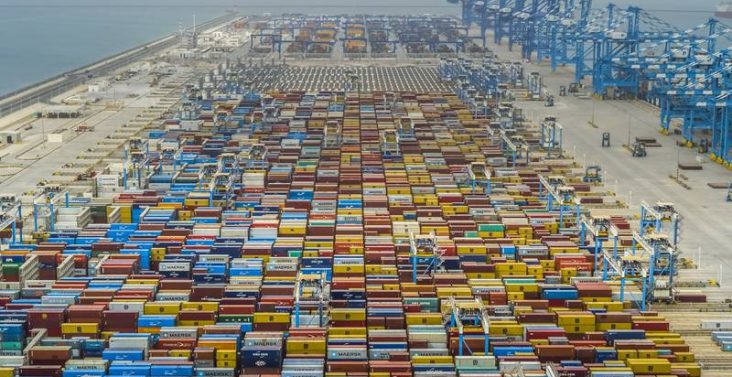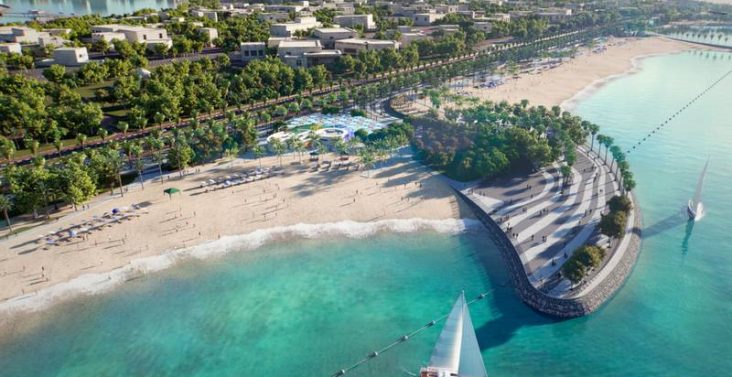The U.S. today sells more compressed methane gas on international markets than any other country, though the export sector here is barely 6 years old.
Fossil fuel industry leaders intend to continue on this soaring trajectory with plans to build a slate of new gas export terminals on the Gulf Coast. More than half of them will be in Louisiana, which ranks second for poverty and fifth for cancer rates among U.S. states.
In Louisiana, energy executives and public officials gathered last week at the Golden Nugget Hotel and Casino for a three-day annual conference on the production and export of Liquified Natural Gas (LNG).
On a waterway behind the casino, a convoy of boats motored past its wide windows with a different vision. From the decks, the activists from across the Gulf coast demanded loudly that the executives leave and abandon their plans to build out the waterfront.
“We got community folks together and we said enough is enough, we can’t take anymore,” said Roishetta Ozane, a local organizer with Healthy Gulf, who led the protest effort. “They’re not helping us at all. They’re only polluting our air and water.”
The region is oversaturated with toxins, she said. Last month part of a Sasol chemical plant exploded nearby. A Westlake Chemical plant exploded several months before that, and in the year before. They contribute to the chemical fog that already fumes from smokestacks around Lake Charles, which is 48 percent Black.
Three export terminals currently operate on the Louisiana coast, including the largest in the nation about 50 miles from Lake Charles. The Calcasieu Pass terminal, some 30 miles from Lake Charles, started operations this year and is still building more. Another seven are proposed, according to the Global Energy Monitor, plus three offshore terminals and two more onshore just across the border in Texas, along a corridor that is already crowded with heavy industry.
“The air is almost unbreathable. It’s smelling like rotting eggs. And when it’s not it smells like chlorine,” Ozane said. “If these industries are so important, they need to go find somewhere where there are no people living.”
However, industrial growth generally commands popular support in Louisiana, where every county but one supported Republican candidates in Tuesday’s election. Most public officials cheer on the development of an LNG export sector on the coast.
Lake Charles Mayor Nic Hunter, who spoke at the industry summit last week, said the new sector meant high-paying jobs would come to the area. He noted that local colleges and universities have “ramped up programing to meet the workforce development demands.”
“The LNG export sector has helped make Southwest Louisiana a major player in a global market,” Hunter said in an emailed statement. “It offers opportunities for today’s youth to stay here in Southwest Louisiana.”
Organizers of the Lake Charles summit said the event advanced conversations on energy security, consumer prices and emissions reductions.
“We are proud of the role of the Americas LNG & Gas Summit & Exhibition as a platform for debate and partnerships at a crucial time for the global gas & LNG sector,” said a spokesperson for the summit. “We wholeheartedly respect the right of protesters to express their views.”
At the protest that Ozane organized, a retired oil company manager stepped up and told the crowd that LNG export wasn’t just bad for the environment, it was bad economics.
“They export our domestic natural resources to the highest overseas bidder. And in turn we see higher domestic prices for our energy,” he remembered telling a small crowd outside the casino.
Allaire joined Aramco as an assistant engineer at a Louisiana refinery in 1980, and retired in 2010 as business manager for all of BP’s gulf coast superfund sites. During those three decades, he said, U.S. hydrocarbon production served domestic markets exclusively. Not a molecule went to foreign buyers from the wells and refineries he serviced.
Since he retired, everything has changed. The fracking boom of the 2010s unlocked far more oil and gas than U.S. producers could sell at home, prompting Congress in 2015 to lift the ban on hydrocarbon exports.
At that time, the vast majority of methane from Texas shale fields was burnt off or released into the air, too costly to store on site. Over the years, a massive network of pipelines took shape to capture the gas at hundreds of wells and move it hundreds of miles to industrial port zones.
“Now the policy is: get it out of the ground as fast as we can, compress it and send it overseas,” Allaire said. “The state of Louisiana is pushing hard to get these things done and the oil and gas industry has a huge lobbying group in Washington and the state capitals.”
Last year the U.S. became the world’s top exporter of liquified gas. Soaring profits for the fossil fuel sector have followed and the industry hopes more will follow.
Five LNG export terminals currently operate along the Gulf Coast, said Naomi Yoder, a staff scientist with Healthy Gulf who attended the LNG summit at the Golden Nugget last week; 14 more await permits and funding, with seven of them concentrated in two Louisiana parishes.
This region offers a convenient combination of cheap waterfront properties, existing industrial infrastructure, access to the shale fields of Texas, international seaports and a license to flaunt federal pollution standards.
“The Gulf Coast is the bullseye for them,” Yoder said. “The Clean Air Act and Clean Water Act regulations that are managed by the state are as lax as you can get without breaking the law.”
Keep Environmental Journalism Alive
ICN provides award-winning climate coverage free of charge and advertising. We rely on donations from readers like you to keep going.
Yoder grew up in Colorado and then worked in California and Washington—all three known for strict environmental policies. After coming to the Gulf to pursue a master’s degree in marine science, Yoder found a different situation where polluters operated freely.
“That was a dramatic realization to me that there is this imbalance,” Yoder said. “There is so much need here.”
Yoder stayed to support campaigns by local communities and joined Healthy Gulf four years ago. Last week at the Golden Nugget, Yoder said, the hopes of the fossil fuel industry centered on supplying Europe’s demand for gas while Germany and other European Union countries swear off Russian energy because of its war in Ukraine.
Industry executives and public officials also discussed logistical challenges facing the LNG boom, like ship traffic and hardware backlogs.
“The need for U.S. LNG to supply and deliver has never been greater,” said a conference brochure, which boasted 100 speakers and 2,000 attendees. “As the world’s largest exporter and key swing supplier, buyers across the world look to the United States for solutions.”
But solutions for world gas markets can mean destruction of natural places and an increase in toxins for coastal communities. Southern Louisiana already hosts the “cancer alley,” an 85-mile expanse between Baton Rouge and New Orleans along the Mississippi River that is home to 150 oil, gas and petrochemical plants.
“They come into a community and pollute at will just to make money. It’s total greed,” said Melanie Oldham, who drove 200 miles to the Golden Nugget from her home in Freeport, Texas, where a new LNG terminal exploded last year.
Oldham, a retired physical therapist, walked the conference’s public exhibit hall and watched through the second-story windows as a convoy of shrimping boats passed by with protest banners aimed at public officials and energy executives, deploring them not to “sacrifice” the coast and urging a transition away from fossil fuels. Oldham heard some conference attendees call the protestors ignorant, she said.
Aboard one of the boats was Christa Mancias, executive director of the Carrizo Comecrudo tribe of Texas, who traveled hundreds of miles from South Texas, where wild land in the Rio Grande delta is slated for development by two LNG terminals.
They would be the first fossil fuel projects in the delta region, which today remains rugged and beautiful. The polluting landscapes of Louisiana, Mancias said, were a warning for what might befall South Texas should industrialization follow the same path there.
“It’s poisonous and it’s ugly. It’s awful. The land used to be pristine and beautiful before all these plants were there,” she said. “All they’re doing is poisoning the people and the land.”
Mancias joined the protest in Lake Charles for a chance to speak before industry leaders and push back against the booming buildout she fears will consume her own family’s home. On board a shrimping ship outside the Golden Nugget windows, she and others shouted their opposition directly at industry leaders who were gathered inside.
“You could see the people in the summit standing in the windows. I’m sure they were upset because they could hear our voices. They had to turn the music on outside, but they could still hear us,” Mancias said.
For Ozane, the organizer of the boat parade, it was the latest attempt to include community voices in conversations about their future. She said state environmental regulators don’t visit her area or consult communities before issuing pollution permits; they rarely follow up on permit violations.
Most public officials support the LNG buildout. A former U.S. energy secretary and Louisiana’s lieutenant governor joined the Lake Charles mayor at the summit.
But people who suffer the negative effects of industrial growth rarely see its benefits. Ozane began organizing after Hurricane Laura in 2020 left thousands of people in southwestern Louisiana homeless or living under blue tarps.
A special education teacher and a single mother of six, Ozane began coordinating online donations and giving from her own pocket to neighborhood families in need. When Healthy Gulf hired her as an organizing director in 2020, she had more money to give. But she noticed that the glaring riches of the industrial sector remained out of reach for most neighborhoods living under tarps.
“They don’t uplift communities,” she said.
With the help of Healthy Gulf, Ozane has brought her message from the rugged and polluted bayou country of Louisiana to the halls of power in Washington, D.C., and New York City. She has spoken about fossil fuel financing with representatives from Bank of America, Goldman Sachs and Chase banks. She met with White House staff and gave a tour of Lake Charles to commissioners from the Federal Energy Regulatory Commission.
“It’s easy to sit at your desk and make a decision, but when you come here and experience what we are experiencing, there is no way you can go back and make decisions the same way,” Ozane said. “They said my name. They remembered me and how my family was affected, so I know I am making an impact.”









